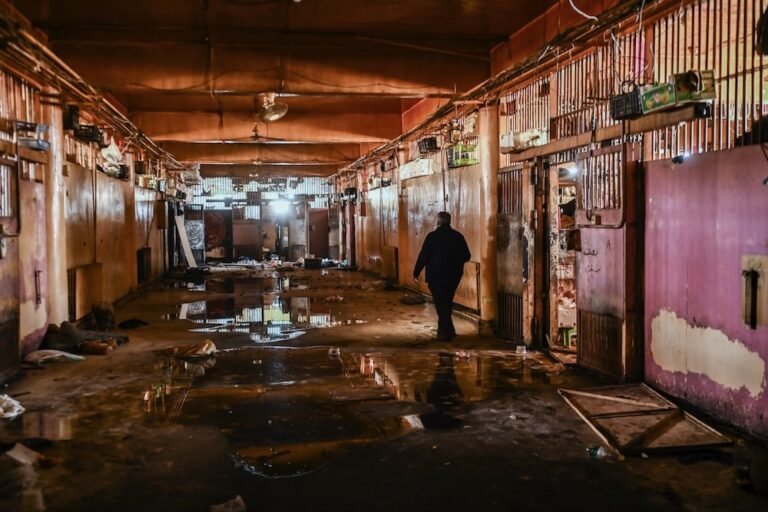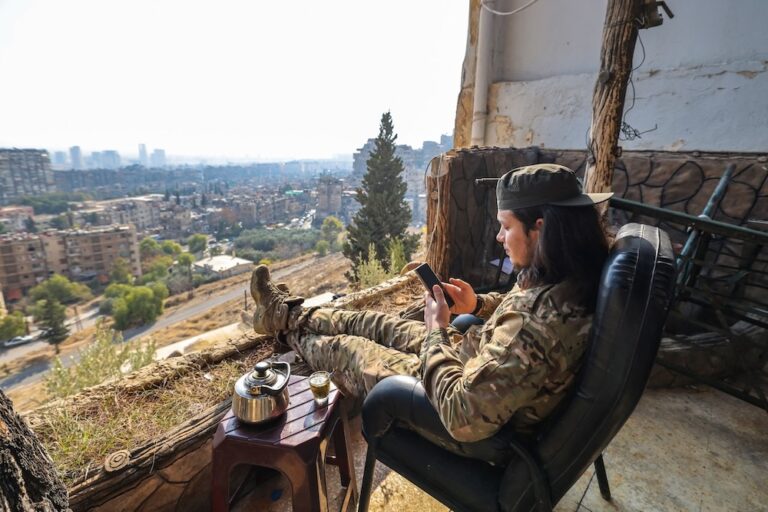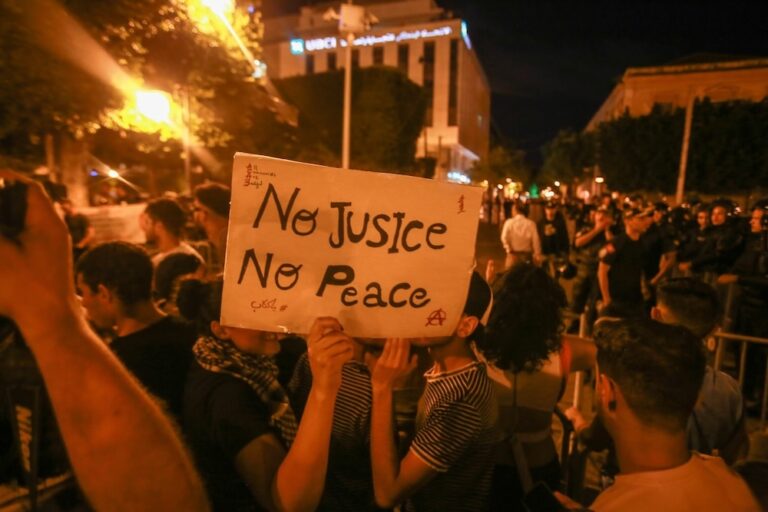June in the Middle East and North Africa: A roundup of key free expression news, based on IFEX member reports.
In Iran, a revolutionary court sentenced on 3 June 2019 prominent journalist Masoud Kazemi, editor-in-chief of the monthly Sedaye Parsi political magazine, to 4.5 years in prison, according to the Committee to Protect Journalists (CPJ). Accused of ‘spreading misinformation’ and ‘insulting the supreme leader and other officials’, Kazemi was also sentenced to a 2-year ban from working as a journalist. Ten days later, on 13 June, journalists working for Gam, a Telegram news channel, were arrested and charged in connection with their reporting of labour issues. This includes Amirhossein Mohammadifard, Gam‘s editor-in-chief, and his wife Sanaz Allahyari, a reporter, who have been in Evin prison without legal representation since 9 January.
Allahyari’s case is also notable due to how her health issues are being systematically ignored by the authorities. This has become a common theme in Iran, with the Gulf Centre for Human Rights (GCHR) expressing its concern “for the health of imprisoned women human rights defenders” in the country. The cases GCHR mention include Nazanin Zaghari-Ratcliffe, a 37-year-old British-Iranian citizen who started a water-only hunger strike on 14 June to protest her ongoing solitary confinement in an unknown location in the province of Kerman; Narges Mohammadi, a woman human rights defender serving a 16-year sentence who was taken to hospital and given an emergency hysterectomy in May 2019, before being transferred back to prison and denied medical care, which led to an infection; and human rights lawyer Nasrin Sotoudeh, who has gone on several hunger strikes to protest poor conditions including lack of medical treatment. Sotoudeh was sentenced in March 2019 to 38 years and 148 lashes.
In Saudi Arabia, there have been credible reports of the imminent execution of three prominent clerics: Salman al-Odah, Awad al-Qarni, and Ali al-Omari. They were arrested in September 2017 during a ‘security sweep’ and have faced abuses and solitary confinement following “overly-broad charges devoid of tangible evidence”, according to the Cairo Institute for Human Rights Studies (CIHRS). On 18 June, the Gulf Center for Human Rights (GCHR) announced that the UN Committee Against Torture is addressing a submission which states that “torture is practiced systematically in Saudi Arabia to extract confessions during interrogations and throughout detention”. This, the submission by GCHR, ALQST for Human Rights, International Service for Human Rights (ISHR) and MENA Rights Group states, has gained an additional level of urgency since it was revealed in November 2018 that women human rights defenders are also being “systematically subjected to torture”, which was “unheard of in the state” up until then.
Meanwhile, Dr. Agnès Callamard, Special Rapporteur on extrajudicial, summary or arbitrary executions, submitted to the United Nations on 19 June a damning report on the murder of Saudi journalist Jamal Khashoggi, pointing to State accountability. Annie Game, Executive Director of the IFEX network, responded in a piece calling on all to join the efforts to end impunity. Human Rights Watch called for the “creation of a comprehensive system to monitor Saudi rights abuses”.
In Bahrain, the government is ramping up its online campaign to attack human rights defenders, Americans for Democracy and Human Rights in Bahrain (ADHRB) reports. Notably, a Ministry official named Sayed Yousif AlMuhafdha, Vice President of Salam for Democracy and Human Rights and a board member of the Bahrain Center for Human Rights (BCHR), currently in exile in Germany, in addition to Hussein al-Satri, an online activist. BCHR responded with a statement urging that Bahrain guarantee “the physical integrity and psychological well-being” of AlMuhadafdha and al-Satri, as well as their families’; “put an end to all threats and acts of harassment”; comply with the United Nations Declaration on Human Rights Defenders; and ensure a broader respect for human rights and fundamental freedoms.
In Israel and Palestine, Palestinian journalist for Anadolu Agency Mustafa Al-Kharouf has been detained for months as Israeli authorities seek to deport him. As the Palestinian Center for Development and Media Freedoms (MADA) reported on 2 June, Al-Kharouf has lived in Jerusalem since he was a child. This is part of the wider campaign by the Israeli government to muzzle freedom of expression on Palestine. Indeed, on 14 June, Reporters Without Borders (RSF) noted that six Palestinian journalists held for “threatening Israel’s security” were tried and convicted that week. Five more are awaiting trial.
Focus on gender
In Egypt, NGOs around the world, including CIHRS, Association for Freedom of Thought and Expression (AFTE), GCHR, Index on Censorship and Syrian Center for Media and Freedom of Expression (SCM), called for the immediate and unconditional release of transgender woman Malak Al-Kashif, arrested in Egypt for expressing her political views on Facebook. These NGOs noted that Al-Kashif’s gender identity has been used against her by the authorities, who continue to refer to her by the male pronoun.
In brief
In Algeria, independent news websites Tout Sur l’Algérie and Algérie Part have been widely inaccessible within the country since 12 June. It seems likely that this is in connection to their coverage of anti-government protests, according to CPJ.
In Syria, photojournalist Amjad Hassan Bakir, who was embedded with the Free Idlib Army, was killed in a suspected regime missile strike on 21 June in the city of Kafr Houd, in Idlib governate.
According to Social Media Exchange (SMEX), Lebanon has witnessed an increase in legal cases against online speech. In May alone, Muhal, SMEX’s observatory, “recorded five cases of citizens, journalists, and activists being summoned by the state for their online posts”
In Western Sahara and Morocco, RSF released a report documenting how the non-self-governing territory has become a “news black hole” due to the Moroccan government’s “constant persecution and repression of Sahrawi journalists”.
If you enjoyed this, check out all the June regional roundups!



